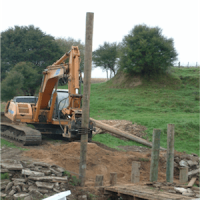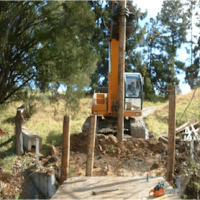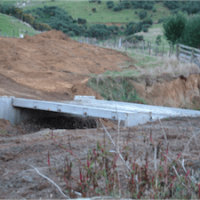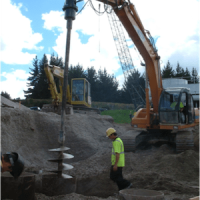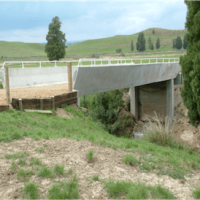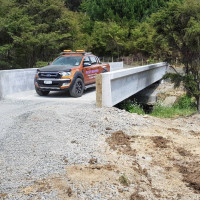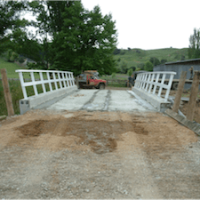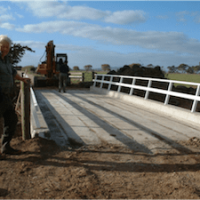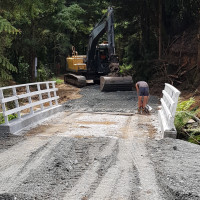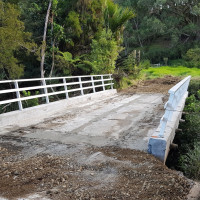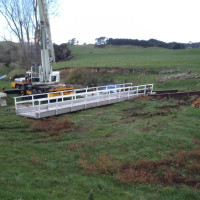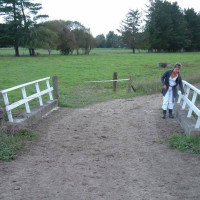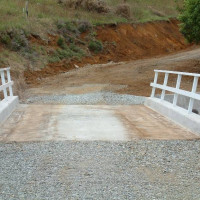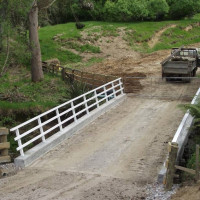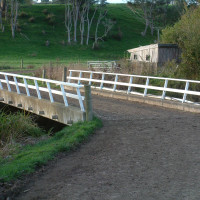Farm Bridge Design & Construction
At Quigleys Farm Bridges, we’re proud to offer expert farm bridge design and construction services to our NZ clients.
Solid Foundations
As your expert bridge builders in NZ, our bridges are not merely dumped on the ground. Instead, we employ advanced techniques such as driving piles below the riverbed or drilling into rock to create foundations that guarantee stability. Each foundation is meticulously designed to suit the unique characteristics of your site, ensuring a bridge that not only spans the gap but stands the test of time.
Handrails and Kerbs
Compliant with the Transit Bridge Manual, our handrails are crafted from high-tensile box sections, ensuring durability and structural integrity. Unlike thin timber rails and small timber kerbs that fall short of compliance, our designs meet code design loadings, providing a secure environment for all bridge users.
In addition, our handrails and kerbs are engineered to withstand vehicle impact. With decks that are a robust 3.7 meters wide, our bridges are built to accommodate trucks and agricultural machinery effortlessly. Each meter of our bridge is as strong as the one next to it, ensuring uniform strength across the entire structure.
The Transformative Benefits of Farm Bridges in NZ Agricultural Regions
Agriculture is a major industry in New Zealand, contributing significantly to the country’s tradeable economy. However, the unique topography of some regions in the country can pose challenges for farmers, making it difficult to access certain areas of their lands. This is where farm bridges come in, providing not only a functional means of crossing obstacles but also delivering several benefits that can enhance productivity and safety.
Among the major advantages of having well-designed farm bridges in NZ include:
Improved Efficiency and Productivity
Time is of the essence in farming and every minute counts. Traditional methods of navigating around natural barriers can be time-consuming and inefficient, resulting in lost productivity. Farm bridges offer a quicker and more efficient way to move resources, equipment, and vehicles across different parts of the land. By eliminating time-consuming detours and obstacles, farmers can streamline their operations, maximising efficiency and ultimately increasing productivity.
Optimised Land Use and Expansion
Land is a valuable resource for farmers, and maximising its use is essential for sustained growth. Farm bridges provide a means to efficiently connect separate parcels of land, enabling farmers to utilise previously isolated areas.
This not only expands the land available for cultivation but also allows for better crop rotation strategies, improved pest management, and enhanced soil health. As a result, farmers can achieve higher yields, diversify their produce, and explore different farming techniques.
Enhanced Livestock Management
For farmers in New Zealand’s agricultural regions, managing livestock across different pastures, paddocks, and barns can be a logistical challenge. Farm bridges provide NZ farmers with a secure and convenient pathway for moving livestock, allowing them to efficiently transfer animals from one area to another.
This not only saves time and reduces stress on the animals but also enables better grazing management and rotation strategies, resulting in healthier livestock and improved overall farm productivity.
Sustainable Agriculture
Sustainability has become an increasingly important aspect of modern farming. Farm bridges contribute to sustainable farming practices by minimising the need for deforestation or land clearing.
Instead of clearing additional land to access separate parcels or installing multiple culverts, constructing a farm bridge reduces environmental impact by preserving natural habitats, waterways, and forests. It allows farmers to work harmoniously with the environment and promote biodiversity.
Flood Risk Management
Many farms face challenges related to water management, especially in areas prone to flooding or irregular terrain. Farm bridges help in effectively managing water flow, preventing soil erosion, and mitigating flood risks. By strategically placing bridges, farmers can control water movement and create a more stable and fertile environment for crops.
Let’s Talk About Your Project
Get in touch with us to schedule a consultation and discuss how we can tailor a solution to meet the unique needs of your property.

